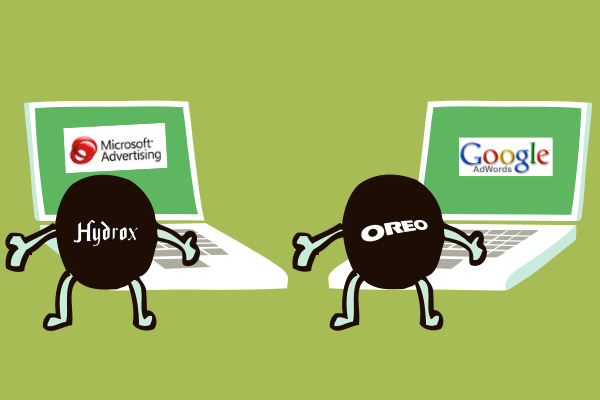BLOG/Digital Marketing
Why adCenter is a Hydrox Cookie
 Preface: Hydrox cookies are like an Oreo cookie, but not nearly as good. I thought everyone would know this, but my editor Denise was puzzled. Please comment if you know what a Hydrox cookie is.
Preface: Hydrox cookies are like an Oreo cookie, but not nearly as good. I thought everyone would know this, but my editor Denise was puzzled. Please comment if you know what a Hydrox cookie is.
 For the longest time Microsoft adCenter has been a Hydrox cookie to me, nothing but an Oreo cookie imitator. By that I mean while I recognize that Hydrox exists, and though people say that it is the same as an Oreo, clearly it is not. As comedian Gary Gullman once said, “The motto for Hydrox cookies should be 'Hydrox by mistake,' because that is the only time that you ever buy them."
I used to have similar feelings about Microsoft adCenter. I recognized that adCenter existed, but when a client said they said they wanted to advertise on AdCenter, what they really meant was that they wanted to advertise on Google - "AdCenter by mistake."
Microsoft adCenter’s system was ridiculous to use, the traffic was low, and for some unknown reason you could only use it with IE. I had lost quite a bit of faith in Microsoft, as they seemed like knock-off artists. What was the Zune but the Hydrox cookie of iPods, what was Bing but the Hydrox cookie of Google search, and what was adCenter but the Hydrox cookie of Google AdWords?
Recently my views have changed.
I kept reading blogs and watching webinars that mentioned all of Microsoft’s new technology with regard to adCenter and (I can't believe I am going to write this) the reviews were actually pretty good! The reviews were good in ways that are important to me and my client such as: dramatically better ROI, and great keyword research tools. According to a webinar I watched by Trada users on Bing spend an average of 6% more than those who are on Google. Additionally, Microsoft improved the interface and I can now use it on my Mac. I decided to give it another try and here are my thoughts:
Where I was impressed:
For the longest time Microsoft adCenter has been a Hydrox cookie to me, nothing but an Oreo cookie imitator. By that I mean while I recognize that Hydrox exists, and though people say that it is the same as an Oreo, clearly it is not. As comedian Gary Gullman once said, “The motto for Hydrox cookies should be 'Hydrox by mistake,' because that is the only time that you ever buy them."
I used to have similar feelings about Microsoft adCenter. I recognized that adCenter existed, but when a client said they said they wanted to advertise on AdCenter, what they really meant was that they wanted to advertise on Google - "AdCenter by mistake."
Microsoft adCenter’s system was ridiculous to use, the traffic was low, and for some unknown reason you could only use it with IE. I had lost quite a bit of faith in Microsoft, as they seemed like knock-off artists. What was the Zune but the Hydrox cookie of iPods, what was Bing but the Hydrox cookie of Google search, and what was adCenter but the Hydrox cookie of Google AdWords?
Recently my views have changed.
I kept reading blogs and watching webinars that mentioned all of Microsoft’s new technology with regard to adCenter and (I can't believe I am going to write this) the reviews were actually pretty good! The reviews were good in ways that are important to me and my client such as: dramatically better ROI, and great keyword research tools. According to a webinar I watched by Trada users on Bing spend an average of 6% more than those who are on Google. Additionally, Microsoft improved the interface and I can now use it on my Mac. I decided to give it another try and here are my thoughts:
Where I was impressed:
- Bing Ads Editor - This looks and functions like a zombie version of AdWords desktop editor. However, once you get the hang of it, the interface is equally easy to use and very similar to AdWords Editor. I really enjoy that I can perform keyword research right from the interface and that it was so easy to initially import Google AdWords Campaigns directly into the editor without needing to upload them. I think Microsoft really took some time putting this together and it works as it should. Making bulk changes is easy, and I found it intuitive.
- Microsoft Ad Intelligence – My favorite part of the Bing ecosystem. I found many of the features to be extremely useful for keyword research such as:
- Webpage keywords – This feature allows you to type in a keyword and it will spit out a list of suggestions. This was extremely useful, especially during ninja-like PPC research on competitors. This is no replacement for Keyword spy, but it helped me discover some new keywords from both my sites and my competitors.
- Searches with your keyword - This feature allows you to input a keyword and it will give you a list of searches that contain your keyword. I liked how this feature expanded keywords I already had. The rate of words I would use is not particularly high (maybe 2 useful ones for every 20 searched), but it did provide me with keywords to go after that I had not found elsewhere.
- Keyword performance – This feature looks at historical data from other advertisers and uses it to predict clicks, impressions, click through rates, average bid, and more. Solid at predicting the cost I will incur and click through rate that I will enjoy. This is more robust than adWords and I found it to be slightly more accurate.
- The quality of the searchers - Microsoft’s searchers are motivated to buy. ROI on all my campaigns, including ones that exactly mirror AdWords have a higher ROI. I am not sure exactly why this is, but I have theories. Some of my theories are: there is less competition in the adCenter system, searchers with Bing are older and have more money, or that Bill Gates himself is buying all the products in an effort to keep the ROI high on Microsoft adCenter.
- Support - Not the customer service respondents who work at Bing, but actually trying to find tutorials, overviews, or papers. For example, Microsoft linking to dead support pages, outdated information, and overviews that are more sales than information. Additionally I could not find a good video tutorial. Try it and you will see. The best Microsoft Ad Intelligence tutorial I could find was about two minutes long. There is a learning center, but you can expect a bunch of videos that look like poorly put together power points which are short on information. This really needs to be addressed if they want advertisers to learn and evangelicalize their system.
- Traffic - I am not entirely blaming Microsoft for this because it was expected. However, with claims of over 25% of all searches performed I expected more impressions and searches. They are surprisingly low on impressions and when I called an adCenter rep they basically said, “We’re not Google!”
More from the
DO Blog

Designing & Building Product Finder Quizzes for eCommer...
Strategy & Planning / December 23, 2020
View Blog Post
3 Customer Motivation Strategies to Improve Your eCommerce i...
Strategy & Planning / July 27, 2020
View Blog Post
